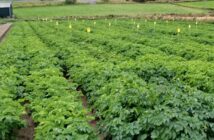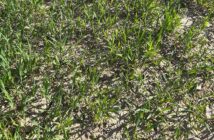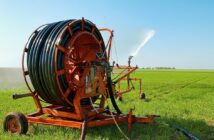Eden has been working closely with experts at NIAB EMR to advance the future of sustainable crop production in the UK. NIAB EMR’s facility in Kent is currently home to research involving Eden’s bio-fungicide Mevalone, which is a sustainable and residue-free solution for the common disease Botrytis cinerea, a fungal pathogen affecting several plant species. This particular disease causes an annual economic loss of between $10-100 billion worldwide.
Notably, NIAB EMR has been involved in the British wine industry since 2015 when it recognised the rapid growth taking place in the sector and the need for R&D to support this growth. A research vineyard was planted in 2015, followed by the establishment of a Viticulture Consortium of NIAB EMR and leading UK vineyards to fund and coordinate R&D support to the sector in 2016. NIAB’s research covers growing systems and resource-use efficiency, genetic improvement and pest and disease control. Compared with average UK vineyard yields of between 4.4 and 5.9 t/ha, NIAB is demonstrating what is possible under conditions in the UK through improved management and growing systems, achieving yields of over 10t/Ha consistently across all varieties.
As the UK wine industry adopts NIAB’s methods, the productivity of this rapidly expanding sector will increase and make the products such as those that Eden is developing even more important for growers. The recently published economic impact report by economists Brookdale Consulting in 2020, concluded that for every £1 spent on vineyard research at NIAB, at least £17.60 is returned to the UK economy through improved production efficiency, economic growth, import substitution, export earnings and inward investment.
Improving yield is a key focus for research projects, as yield has a direct impact on the profit for the growers, and an increased profit in turn allows growers to invest in new innovations to grow and protect their crops. The environment can influence the harvest, and in recent times, the warmer weather has extended the ripening period for grapes. Warmer weather combined with rainfall or high humidity results in an extended “danger” period where fungal diseases grow and it has become even more critical for growers to have the right products to protect their crops in challenging times.
The safety of people is also paramount when it comes to sustainable viticulture and growers prioritise products with improved safety profiles and reduced risk of residues, which could be harmful to those involved in the growing process. In coming years Eden aims to provide UK growers with a sustainable way to protect against botrytis, following the approval of Mevalone in the UK.
Julien Lecourt, head of Viticulture and Wine Research and Innovation at NIAB EMR, says that consumer concerns around pesticides are heightened when it comes to wine: “Wine is considered a luxury product and you simply can’t have a luxury product with pesticide residues. This concept is two-fold as the public wants ‘cleaner’ wines and in turn growers are becoming more critical about the risks associated with the products they are using. Thankfully, technology is improving in tune with this trend, allowing growers to apply more sophisticated tools to analyse products and measure residues that might have an impact on workers and consumers, allowing them to make informed decisions to switch to alternative products.”
For organic wine growers, the options for crop protection products are even more scarce. Organic production can cost growers approximately 30-50% more than conventionally produced wine and in turn it heavily increases the price tag on the bottle. In terms of crop protection, organic growers are looking for environmentally friendly products that won’t significantly increase the cost of production. Subject to local product authorisation and certifications, Mevalone can offer growers an option that is both organic and has efficacy on par with conventional chemistry.
Sean Smith, chief executive officer of Eden Research plc, commented on the partnership: “We are proud to be involved with NIAB EMR and to be members of the Viticulture Consortium. NIAB’s overall wine strategy, which is to use today’s technologies to speed things up and develop science-based viticulture practices for the UK, aligns perfectly with our ethos. NIAB EMR is a facility where all efforts are focused on sustainability and championing three key elements crucial to the success of the industry; profit, environment and people. The importance of sustainable viticulture continues to grow in response to public concern over traditional pesticides, and experts in the UK are increasing efforts to find the right solutions for consumers and growers alike.”
Wine doesn’t have to be labelled “organic” to be produced in an environmentally favourable manner. This is the balance that experts in sustainable viticulture are trying to reach. Conventional growers care just as much about the environment as organic growers, and as wine consumers themselves, they are very conscious of what products are used in the crop lifecycle. Eden’s products are promising examples of products that are already commercialised in a number of countries globally, free from residues and a valuable part of sustainable agriculture practices in conventional and organic growing scenarios.




